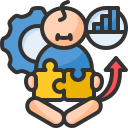If a child can hold a pencil, write their own name, count to 100, recognize all colors and shapes but, doesn’t know how to manage their emotions, make friends, resolve conflicts, be independent and have self-help skills, then none of the other things matter.
To put it simply, when a child shows up for school and is not physically and mentally ready to learn, he or she never catches up. School readiness refers to whether a child is ready to make an easy and successful transition into school. The development of school readiness skills allows school teachers to expand and further develop a child’s skills in the specific areas of social interaction, play, language, emotional development, physical skills, literacy and fine motor skills. When a child enters school without these basic skills, he/she might very soon be found lagging behind at school in comparison to their classmates.
In addition to academic basics, our school readiness programme also focuses on 1. SELF CARE- eating, opening/ closing boxes and bottles, using a spoon/ eating with hands, washing hands, wiping their nose, asking for help when sick, dressing/ buttoning/ unbuttoning, open/close zip.
The aim of our school readiness programme at HAPPY CHILD DEVELOPMENT AND REHABILITATION CENTRE is to teach and improve these foundation skills in children who are about to start school.

Many children enter school with academic abilities like color recognition, counting, and writing their name.

Despite academic strengths, children often struggle with emotional regulation, social interactions, and self-reliance.

Lacking life skills can hinder their ability to make friends, resolve conflicts, and be self-sufficient.

These skills are essential for success, extending beyond academics to influence all areas of development.

Even academically advanced children may face developmental challenges without social and emotional skills.

Children learn to manage personal tasks such as eating, using utensils, washing hands, dressing, and asking for help when needed.

We encourage children to be independent by teaching them routines like using the toilet, cleaning up after play, and being comfortable away from parents.

Children are taught essential social skills like turn-taking, sharing, and conflict resolution.

We help children develop foundational skills in speaking, listening, understanding, and writing, ensuring they are well-prepared for the classroom environment.

Gain the confidence to manage everyday tasks independently.

Learn how to express their emotions and interact positively with peers.

Develop key language and literacy skills that will help them excel academically.

Enter school with the physical, emotional, and social tools needed to thrive.

Be better prepared for a smooth transition into the structured environment of school, allowing them to keep pace with their peers and build a strong foundation for future learning.